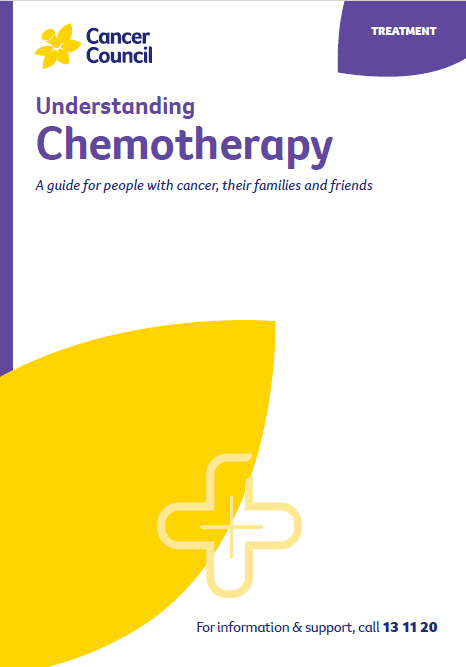- Home
- About Cancer
- Cancer treatment
- Chemotherapy
- Managing side effects
- Blood-related side effects
- Infections
Infections
Chemotherapy can reduce your white blood cell level, making it harder for your body to fight bacterial infections.
Learn more about:
- Risks of infection
- The role of white blood cells
- Having vaccinations
- Taking care with infections during chemotherapy
Risks of infection
Bacterial infections that cause sickness may come from somewhere in your body (e.g. the bowel) and are not necessarily caught from other people.
Viruses such as colds, flu and COVID-19 may be easier to catch and harder to shake off, and scratches or cuts may get infected more easily. Your doctor may recommend antibiotics as a precaution against infection. Learn some other ways to reduce your risk of getting an infection.
The role of white blood cells
There are many types of white blood cells. One type, called a neutrophil, protects you against infection by destroying harmful bacteria and yeasts that enter the body. Chemotherapy can reduce the levels of neutrophils. This is known as neutropenia.
To boost production of new white blood cells and protect you from infection, your doctor may give you injections of a growth factor drug called granulocyte-colony stimulating factor (G-CSF). Some people may experience bone pain or tenderness at the injection site. Let your doctor know if you have any of these side effects.
Having vaccinations
Some vaccinations are safe to have during chemotherapy treatment and others are not. It is generally safe to have the flu vaccine and the COVID-19 vaccines available as at June 2024, but speak to your doctor before having these vaccinations.
During chemotherapy and for about 6 months after, it is often advised that you don’t have vaccinations that contain a live vaccine, such as varicella (chickenpox), zoster (shingles), and MMR (measles, mumps, rubella) vaccines. Your doctor can provide more information.
→ READ MORE: Taking care with infections during chemotherapy
Podcast for people affected by cancer
Listen now
More resources
A/Prof Kate Mahon, Director of Medical Oncology, Chris O’Brien Lifehouse, NSW; Katherine Bell, Dietetics Department, Liverpool Hospital, NSW; Brigitta Leben, Dietetics Department, Liverpool Hospital, NSW; Sophie Michele, 13 11 20 Consultant, Cancer Council SA; Dr Jess Smith, Medical Oncologist, Macquarie University Hospital, NSW; Karene Stewart, Consumer; Julie Teraci, Clinical Nurse Consultant, Skin Cancer and Melanoma, Cancer Network WA.
View the Cancer Council NSW editorial policy.

